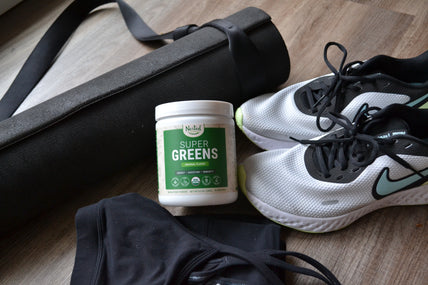An Athletes Guide to Supplements

We have all seen it time and time again. Athletes, and those who are so inclined, pushing themselves hard every single day in the gym, on the track, in competition. All go, all the time. That’s great, but athletes (although incredible) tend to have an issue with “taking care” of themselves until something goes wrong. Not enough sleep, not enough rest, not fuelling their body correctly, and not giving themselves the proper tools to be their best.

Athletes, believe it or not, are like children. They just want to do the fun stuff and hate having to do the boring stuff like cook, rest, and take their vitamins. Let's face it, it’s way easier to knock back a protein shake and some BCAA’s than it is to make a full meal.
Eat to perform is all about giving your body what it needs to meet the demands of your everyday life, in and out of the gym. Yes, a huge part is eating clean foods that are minimally processed, but good supplementation is also a vital part of anyone, not just an athlete's, life.
There is so much marketing and research out there on supplements – what to take, how much, who needs what – that it can be confusing to sift through and narrow down. Here is what we recommend for those who just feel they are missing something: Magnesium, Vitamin D3, Vitamin K2, and B vitamins.
Magnesium
Approximately 50% of Americans are deficient in magnesium. Magnesium is an extremely important mineral. It has a role in over 300 biochemical reactions! For example, it is critical for energy production, protein synthesis, muscle contraction and relaxation, and insulin metabolism.
If you are lacking enough magnesium then your performance will most definitely suffer due to lactic acid build-ups, muscle cramping, poor recovery, and you can even experience twitchy heart arrhythmia.

How are so many of us, especially athletes, deficient in such an important mineral? The answer is simple. Exercise. Strenuous exercise can cause a loss of magnesium through sweat and urine by as much as 20%. We may think we are getting enough magnesium in our diet.
However, while magnesium is found in foods like dark green leafy vegetables, spinach, beans, avocado, nuts, dark chocolate, and bananas. many of these foods are deficient in minerals in general because of bad soil and untested growing methods. Add to that the lack of variation in many athletes diets, it’s no wonder there are deficiencies.
When supplementing your diet with a magnesium tablet make sure you check the label. Magnesium that is presented as Magnesium Glycinate or malate are much better tolerated by the digestive system and more readily absorbed by the body than other cheaper forms such as magnesium oxide or magnesium carbonate.
Vitamin D3
Vitamin D is probably the most underrated vitamin in the world. However, it is actually more like a hormone than a vitamin. It is produced when the body is exposed to sunlight, however, most of us are deficient as we don’t spend enough time out in the sun to make it. Even if we decided to frolic around in the sun for a couple of hours EVERY day, we actually still wouldn’t get enough.

Vitamin D is such an impressive substance. It works with Calcium to improve bone density, helps reduce inflammation, reduces the risk of colon and breast cancer, improves mood, fights infection, and it helps the brain to release melatonin so you can fall asleep faster! Vitamin D is so effective that in 1927 a controversy arose in athletic world regarding vitamin D.
The “German Swimmers Association” decided to use sun lamps on their athletes to boost Vitamin D and thus performance. The controversy arose as some people considered this “athletic unfairness”, but it was just ensuring athletes got enough vitamin D! Many people are deficient in Vitamin D so treating this can help athletes prevent stress fractures, improve reaction time, muscle strength, speed, and endurance. Now we wouldn’t recommend sitting under a sun lamp or tanning bed to get your vitamin D, much easier and safer to take a supplement.
B vitamins
B vitamins are important for producing energy, detoxifying which is needed after have training, and improving mood by acting as neurotransmitter cofactors. Building and repairing muscles cuts into your B vitamin stores. If you are training well and lifting heavy or damaging your muscles in work then you need to take extra b vitamins to help rebuild and strengthen your muscles. ideally look for B-1, B-2, B-6 and B-12 as they are the most absorbable forms for your body.
Vitamin K2
We already discussed the importance of vitamin D, but pairing it with vitamin K2 is going to really make a big difference. Vitamin K helps with blood coagulation. There are many types of vitamin K but we will just look at Vitamin K1 and K2 (MK-7 to be specific).
Vitamin K1 is naturally occurring and found in those vegetables we all know and love. Its main function is to direct calcium to your bones, because “them bones, them bones, need calcium”. Vitamin K2 (MK-7) is the most bioavailable form of Vitamin K and is also considered the most active form and is covert to vitamin K1 in the body by your gut bacteria.
Vitamin K is important because it increases the production of two proteins called osteocalcin and collagen. Osteocalcin is actually produced by cells called osteoblasts, and it’s function is to direct calcium to the bone and support mineralization. To break it down, osteocalcin takes calcium and puts it into your bones where it belongs.
So hopefully you know have a better understanding of what your body needs to perform. It is great to be active, but it is just as important to take care of what your body needs. Think longevity, big picture, your future. Be an athlete at eighty, not just eighteen.
References:
Smith, G.I., Atherton, P., Reeds, D.N., Mohammed, S.B., Rankin, D., Rennie, M.J. and Mittendorfer, B. (2012) ‘Omega-3 polyunsaturated fatty acids augment the muscle protein anabolic response to hyperaminoacidemia-hyperinsulinemia in healthy young and middle aged men and women’, 121(6).
Chang, C., Ke, D. and Chen, J. (2010) ‘Essential fatty acids and human brain’, Acta neurologica Taiwanica., 18(4), pp. 231–41.
Guzmán, J.F., Esteve, H., Pablos, C., Pablos, A., Blasco, C. and Villegas, J.A. (2011) ‘DHA- Rich Fish oil improves complex reaction time in female elite soccer players’, 10(2).
Melamed ML, Michos ED, Post W, Astor B. 25-Hydroxyvitamin D levels and the risk of mortality in the general population. Arch Intern Med. 2008;168(15):1629-37
Autier P, Gandini S. Vitamin D supplementation and total mortality: a meta-analysis of randomized controlled trials. Arch Intern Med. 2007;167(16):1730-7.
Athletic Performance and Vitamin D , JOHN J. CANNELL, BRUCE W. HOLLIS, MARC B. SORENSON, TIMOTHY N. TAFT, and JOHN J. B. ANDERSON
If you're looking for the top-notch vitamins to support your heart health and circulation, check out our comprehensive guide on the "10 Best Vitamins for Heart Health & Circulation."



